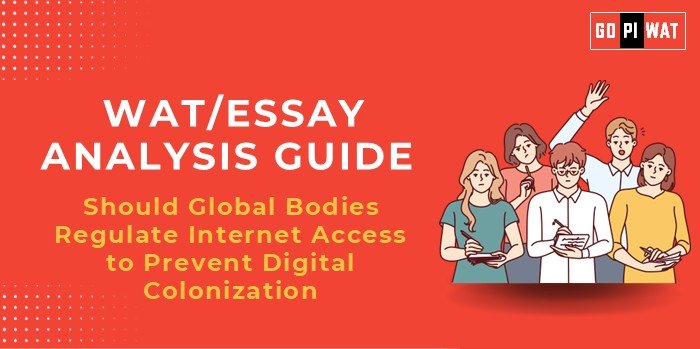📋 Written Ability Test (WAT)/Essay Analysis Guide
🌍 Topic: Should Global Bodies Regulate Internet Access to Prevent Digital Colonization?
📖 Understanding the Topic’s Importance
💡 The topic delves into digital equity, market dominance, and sovereignty—key concerns for future global business leaders. Understanding these dimensions helps in crafting balanced policies in leadership roles.
🕒 Effective Planning and Writing
- ⏱️ Time Allocation:
- Planning: 5 minutes
- Writing: 20 minutes
- Review: 5 minutes
- 📚 Preparation Tips:
- Identify key stakeholders like global bodies, tech giants, and national governments.
- Include global examples like GDPR, China’s internet policies, and IGF initiatives.
- Back arguments with relevant data and trends in digital governance.
✍️ Introduction Techniques for Essays
- ⚖️ Contrast Approach:
“While tech giants facilitate innovation, their dominance threatens the internet’s democratic nature.”
- 🌍 Global Example:
“With the EU’s GDPR redefining data privacy, global bodies are urged to regulate internet access equitably.”
📚 Structuring the Essay Body
- 🏆 Achievements:
- Highlight global successes like the General Data Protection Regulation (GDPR).
- Discuss collaborative initiatives like the Internet Governance Forum (IGF) promoting open dialogue on digital policy.
- ⚠️ Challenges:
- Examine issues of sovereignty and national resistance to global frameworks.
- Discuss risks of stifling innovation through over-regulation.
- 🌏 Future Outlook:
- Advocate for a hybrid model balancing global oversight with respect for national policies.
- Encourage public-private partnerships to address digital inequities.
🔑 Concluding Effectively
- ⚖️ Balanced Template:
“Global internet governance is crucial but must respect individual nations’ unique needs and capacities.”
- 🌍 Comparative Template:
“By blending lessons from GDPR and decentralized models like Estonia, equitable internet regulation can be achieved.”
📄 Sample Short Essays
- ⚖️ Balanced Perspective:
“Global bodies must regulate internet access to ensure fairness and inclusivity while respecting nations’ rights to self-regulate their digital ecosystems.”
- 💡 Solution-Oriented:
“A hybrid model, blending global guidelines and local governance, can mitigate risks of digital colonization while fostering innovation.”
- 🌏 Global Comparison:
“Learning from GDPR’s success and China’s controlled internet approach, the future lies in globally standardized but locally adaptable frameworks.”


